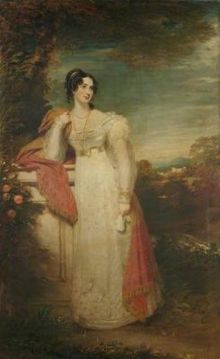Sir John Jacob Buxton, 2nd Baronet (13 August 1788 – 13 October 1842) was a politician from Shadwell Court in Brettenham, Norfolk[1][2] who sat in the House of Commons from 1818 to 1832.
Buxton was the eldest son of Sir Robert Buxton, 1st Baronet and his wife Juliana Mary Beevor. He was educated at Harrow School and at Christ Church, Oxford.[3] He led the life of well-to-do Victorian country gentlemen, and concentrated on his estates, administrative offices and charitable work in the county and the cultivation of an agreeable social life.[4]
Buxton was elected Member of Parliament for Great Bedwyn in 1818 and held the seat until it was replaced under the Great Reform Act in 1832.[5] He succeeded to the title of 2nd Baronet Buxton, of Shadwell Lodge, Norfolk on 7 June 1839 and was High Sheriff of Norfolk in 1841. He enlarged Shadwell Lodge to the designs of Edward Blore, one of the leading architects of the time and the house was enlarged and remodelled in the Jacobean style between 1840 and 1842.[4]

Buxton died aged 54 at Tunbridge Wells, Kent. He married Elizabeth Cholmeley, daughter of Sir Montague Cholmeley, 1st Baronet and Elizabeth Harrison, on 5 August 1825 at St. George's Church, St. George Street, Hanover Square, London. His son Robert succeeded him in the baronetcy. His daughter Elizabeth married Walter Spencer-Stanhope.[3]
References[edit]
- ^ "Buxton". www.stirnet.com. Retrieved 23 March 2022.
- ^ Shadwell Court - Brettenham - Norfolk - England | British Listed Buildings Retrieved 2016-11-05.
- ^ a b the Peerage.com
- ^ a b Cambridge University Library: History of Buxton family of Norfolk
- ^ Leigh Rayment's Historical List of MPs – Constituencies beginning with "G" (part 2)